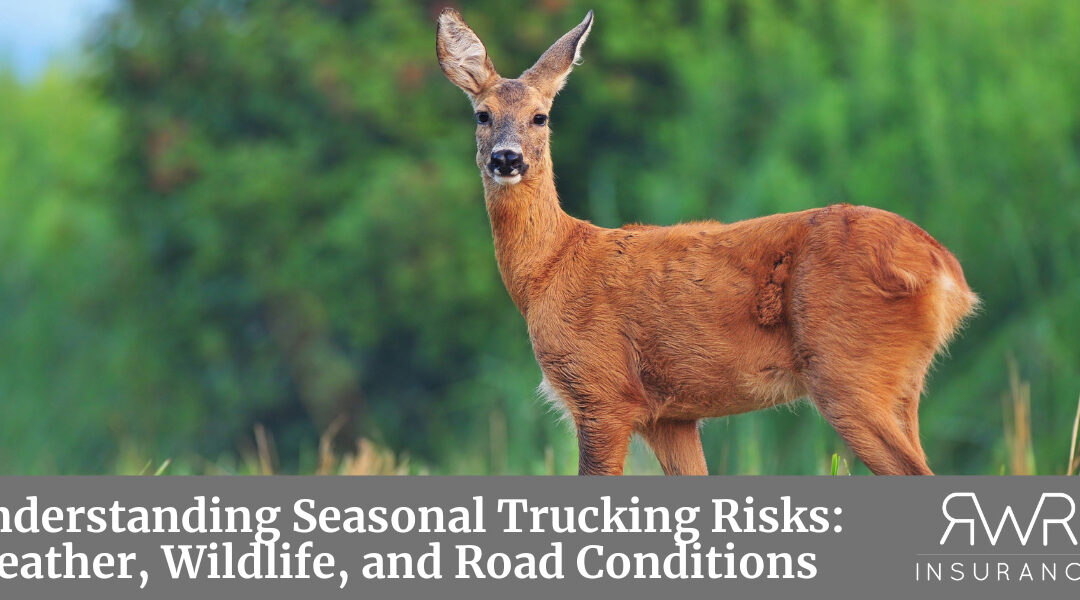As the seasons change, so do the challenges that come with being a truck driver. Whether you’re navigating icy roads in winter or dealing with sudden downpours in the spring, seasonal risks can affect both your safety and your business. For trucking companies, understanding these risks and preparing for them is key to minimizing disruptions and avoiding accidents.
Weather-Related Risks
The weather is one of the most unpredictable factors affecting the trucking industry. Each season brings its own set of challenges:
- Winter: Icy roads, snowstorms, and limited visibility make winter the most dangerous time for truckers. Black ice and snow buildup can cause vehicles to lose traction, leading to accidents or jackknifing. Proper tire maintenance, reduced speeds, and increased stopping distances are essential for staying safe during winter.
- Spring: While temperatures warm up, spring also brings heavy rainfall and flooding. Wet roads reduce traction and increase stopping times, while standing water can lead to hydroplaning. Truckers need to be cautious of weather forecasts and avoid driving through flooded areas.
- Summer: Heat can lead to tire blowouts and overheating engines. In some regions, summer storms can create hazardous driving conditions with high winds and lightning. It’s important to perform routine maintenance to ensure your truck is in top shape, especially during extended summer trips.
- Fall: Falling leaves, fog, and early morning frost can make driving tricky. In addition, harvest season brings increased agricultural traffic on rural roads. Truckers should be alert for slower-moving vehicles like tractors and be cautious in areas where leaves can make roads slippery.
Wildlife on the Move
As the weather changes, so does the behavior of wildlife, increasing the chances of encounters with animals on the road. Fall is particularly dangerous for wildlife collisions as animals like deer become more active during mating season. Truckers driving through rural or forested areas should:
- Be aware of wildlife warning signs.
- Reduce speed, especially in the early morning or evening when animals are most active.
- Use high beams when safe to improve visibility.
- Avoid swerving to miss animals, as this can cause rollovers or collisions with other vehicles.
Insurance claims for animal-related accidents spike in the fall, making it important for truckers to remain vigilant and understand how their insurance policy covers such incidents.
Road Condition Hazards
Changing road conditions are another seasonal risk. As temperatures drop, potholes and cracks can form, leading to uneven driving surfaces that are especially hazardous for heavy trucks. In addition:
- Frost heaves (uneven sections of the road due to freezing and thawing) can cause trucks to bounce, potentially leading to loss of control.
- Mud and soft shoulders can make rural or unpaved roads more dangerous, especially in spring when melting snow or rain increases mud on the road.
- Construction zones tend to be more common in warmer months, requiring truckers to slow down, navigate detours, and deal with lane closures.
Truckers should adjust their driving habits to match the road conditions, be prepared for sudden lane changes or detours, and always ensure their cargo is securely loaded to prevent accidents.
How Commercial Truck Insurance Helps
The unpredictability of seasonal risks makes having the right commercial truck insurance crucial. From collisions with wildlife to weather-related accidents, comprehensive coverage protects both truckers and their businesses from financial loss. Key coverage options include:
- Collision coverage for accidents, including animal strikes.
- Comprehensive coverage for non-accident-related damages, such as weather damage.
- Liability insurance for damage caused to other vehicles or property.
Truckers face a variety of seasonal risks, from treacherous winter roads to increased wildlife activity in the fall. Being aware of these hazards and taking preventive measures can reduce the likelihood of accidents and help ensure safer trips. However, even with the best preparation, accidents can happen. That’s why it’s essential to have the right commercial truck insurance in place to keep your business moving forward—no matter the season.
Disclaimer: The content provided in this blog is for informational purposes and should not be considered an offer for coverage. Each insurance policy is unique and may have varying terms, conditions, and exclusions. It is essential to consult with a qualified insurance professional or licensed agent for personalized advice tailored to your specific needs. This blog does not constitute a contract, policy, or guarantee of coverage. Always refer to your individual policy documents for full details.

